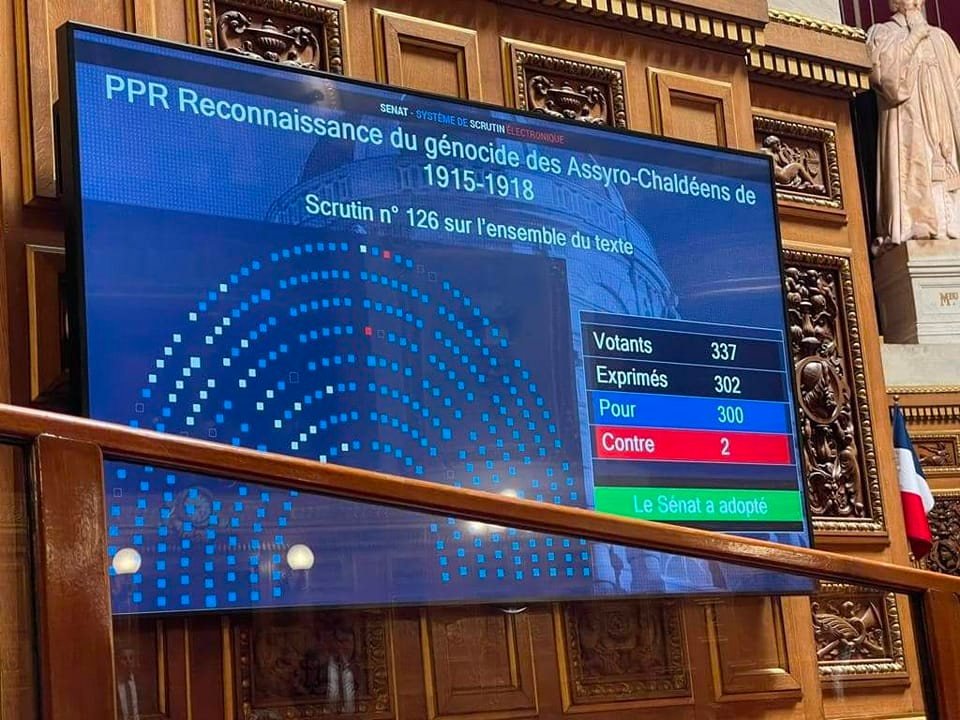POLITICS: France recognizes Seyfo Genocide of 1915
300 French Senators vote in favor of a bill recognizing the Assyrian-Chaldean Genocide of 1915 (Photo/Senator Valérie Boyer)
By Maryam Ishaya
On Feb. 8, an Assyrian-Chaldean Genocide recognition bill was approved shortly after presentation to the French Senate. The bill was drafted by Senators Valérie Boyer and Bruno Retailleau.
The Association of Assyrian-Chaldeans in France (AACF) brought the resolution to the Senate. The bill recognizes the atrocities that the Ottoman Empire committed against the Assyrians (also known as “Chaldeans” or “Syriacs”), Armenians and Greeks from 1915 to 1918. Often, this is referred to as the Armenian Genocide. Assyrians refer to it as “Seyfo”, meaning sword, or year of the sword, in Neo-Aramaic.
Within 1 hour and 30 minutes of introduction, the bill was officially recognized. Among the 302 Senate members who voted for the bill, an overwhelming majority of 300 voted in favor of it. The official bill recognizes the mass murders and forceful conversions to Islam the Ottoman regime committed against the Assyrian population from 1915 to 1918. Additionally, the ballot recognizes April 24 as the official day of annual commemoration of the Assyrian and Armenian genocide.
After the passing of the bill, His Holiness Catholicos-Patriarch of the Assyrian Church of the East, Mar Awa Royel III, went to France to attend a dinner gala hosted by the AACF. His Holiness believes that France played an integral role in recognizing Seyfo. He said, “France is important because it is one of the leading nations of the free and ‘first’ world. It is a major player in not only European but world politics.”
His Holiness continued and said, “The French government has recently recognized the Armenian genocide officially. This is a stepping stone for France's formal and full recognition of the Assyrian genocide.”
During the genocide, 1.5 million Armenians , 250,000 to 300,000 Assyrians and approximately 1 million Greeks were estimated to have lost their lives.
According to the AACF, France is home to about 30,000 Assyrians. As the threats of persecution continued against the Assyrians and other Christian communities in the Middle East, many fled to France to seek refuge during the 1920s. Many members of the Assyrian community were able to settle down in Marseille, France. Today, approximately 130 Chaldean families remain in Marseille, Sarcelles and others reside in the suburbs of Paris.
Sabri Atman, Founder and Director of the Seyfo Research Center, and Joseph Yacoub, an honorary professor at the Catholic University of Lyon, were present in the senate on Feb. 8.
Atman, who has frequently given speeches about the genocide to the French Senate, has faith that other countries will soon follow suite in recognizing Seyfo. Atman said, “This resolution can be served as a references when we ask other countries to recognize the 1915 Seyfo Genocide.” Currently, Atman is in the process of organizing several conferences in Sweden and advocating for the European Parliament to request other international communities to recognize Seyfo. Atman said, “I credit the AACF and the Assyrian community of France. This resolution would not have been successful without them.”
As of 2022, only 33 countries have formally recognized the Armenian genocide. France is one of the few that recognizes Assyrians as victims of the genocide, along with Sweden and Australia in 2010. In 2015, the Republic of Armenia, the Netherlands, the Holy See, Austria, Germany, Syria and the Czech Republic also acknowledged the Seyfo genocide.
Fareed Elya, a member of the Kurdistan Regional Government (KRG), holds similar aspirations as Atman. Elya said, “This is a momentous day for Assyrians. Having France recognize Seyfo will add further pressure on Turkey to acknowledge the genocide.” Elya added, “This also opens the opportunity to have other countries recognize Seyfo and other Assyrian genocides.
Türkiye’s Foreign Ministry spokesman, Tanju Bilgiç, claimed in a statement that the recognition of the bill “lacks legal and historical basis.” Bilgiç continued and said, “Türkiye does not need to take history lessons from anyone” and added “The French Senate should look to its own history, rather than lecturing others.”
The Turkish government denies the genocide, and Turkish President Recep Erdogan refers to these communities as “leftovers of the sword.” Across the world, there are many monuments dedicated to honoring the victims of the 1915 genocide. Atman, alongside other members of the Seyfo Research Center, are committed to earning support from additional countries to recognize Assyrians as a part of the 1915 genocide.
Maryam Ishaya (MIA ‘23) is a first-generation Assyrian-American graduate student at Columbia University. She is an activist for the Indigenous Assyrian community residing in Iraq, Syria, Turkey and Iran.

